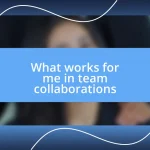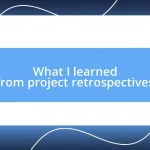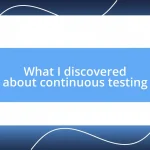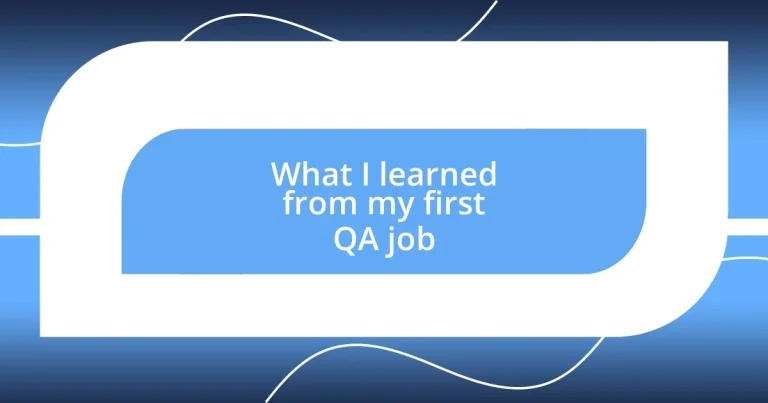Key takeaways:
- Embracing curiosity and asking questions fosters learning and collaboration, essential in navigating early QA challenges.
- The importance of attention to detail and effective communication emerged as crucial skills for managing ambiguity in requirements and enhancing teamwork.
- Adaptability and celebrating small victories are vital for sustaining motivation and continuous growth in the fast-paced QA environment.
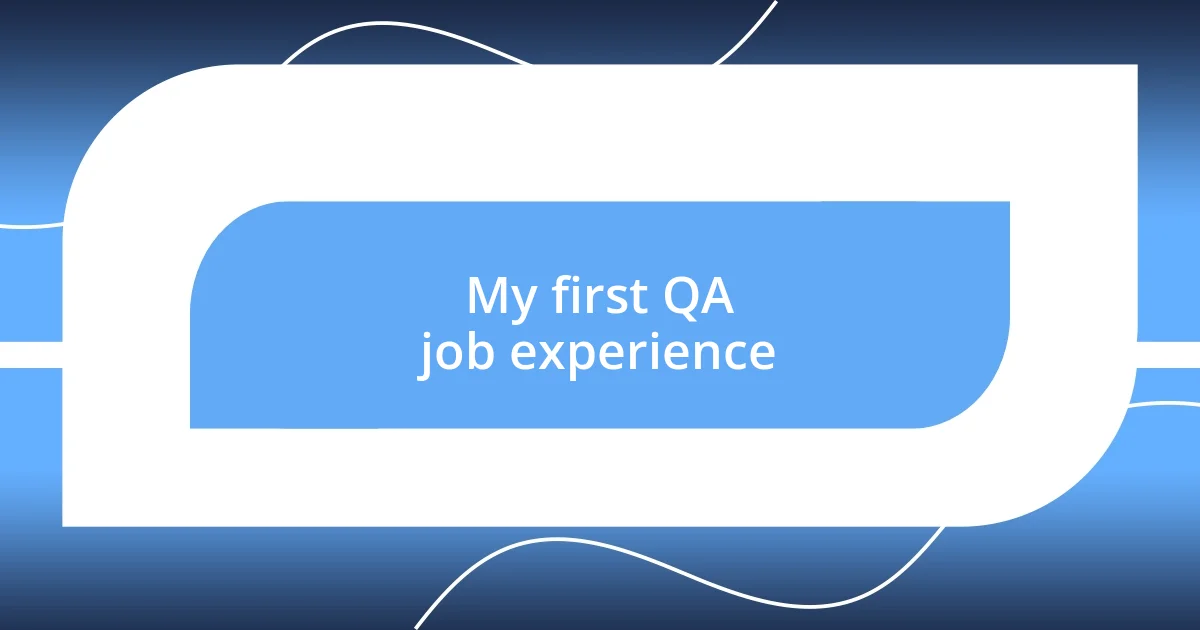
My first QA job experience
Stepping into my first QA job felt exhilarating yet intimidating. On my very first day, as I stared at the sprawling codebase, I couldn’t help but wonder, “How on earth will I ever understand all this?” In those first few weeks, I learned that asking questions wasn’t just okay—it was essential. I vividly recall a moment when I timidly approached a senior developer, and to my surprise, he welcomed my curiosity. That little exchange opened up a world where collaboration was the norm, making me feel more at home.
As I delved into writing test cases, I experienced a mix of frustration and triumph. I remember crafting my first test case only to watch it fail spectacularly. At that moment, doubt crept in. Was I cut out for this role? But in time, I realized that failure was merely a stepping stone. I began to embrace it, knowing it was an opportunity to learn and refine my skills—an essential part of the QA journey.
My most memorable experience occurred during a critical release deadline when we discovered a major bug just hours before deployment. The stress was palpable, and I felt the weight of the team’s expectations pressing down on me. In those frantic hours, I learned the power of teamwork and how calm communication could turn a potential disaster into a manageable situation. That experience solidified my love for QA—it’s not just about finding bugs; it’s about supporting each other through the chaos. How about you? Have you ever experienced that heart-pounding urgency in your job?
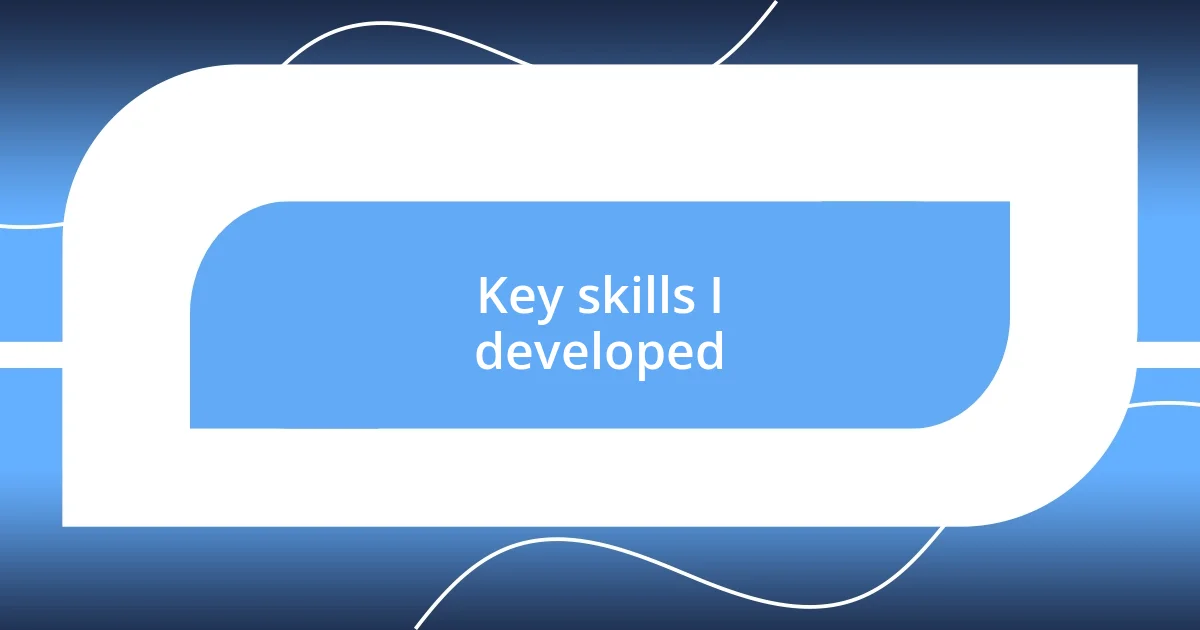
Key skills I developed
One of the key skills I developed during my first QA job was attention to detail. I quickly learned that even the smallest oversight could lead to significant issues down the line. I recall a particular feedback session when my manager highlighted a minor typo in a test case that caused a cascade of errors during testing. It was a humbling experience, but it taught me the value of meticulousness. Now, I approach every task with a mindset that values precision, understanding that it directly influences the quality of the end product.
Additionally, I honed my analytical thinking. Each bug I encountered forced me to look beyond surface-level issues and consider the underlying causes. I vividly remember a challenging bug related to user authentication that seemed impossible to pinpoint at first. After digging deeper, I uncovered a misalignment between the front-end and back-end logic. This experience sharpened my troubleshooting skills and enhanced my ability to think critically under pressure.
Here are some key skills I developed during that time:
- Attention to Detail: Understanding that small mistakes can lead to big problems.
- Analytical Thinking: Learning to assess issues critically and identify root causes.
- Effective Communication: Cultivating the ability to convey findings clearly to both technical and non-technical team members.
- Test Case Writing: Mastering the craft of creating concise and comprehensive test cases that truly capture the requirements.
- Time Management: Balancing multiple priorities while ensuring high-quality outputs, especially during tight deadlines.
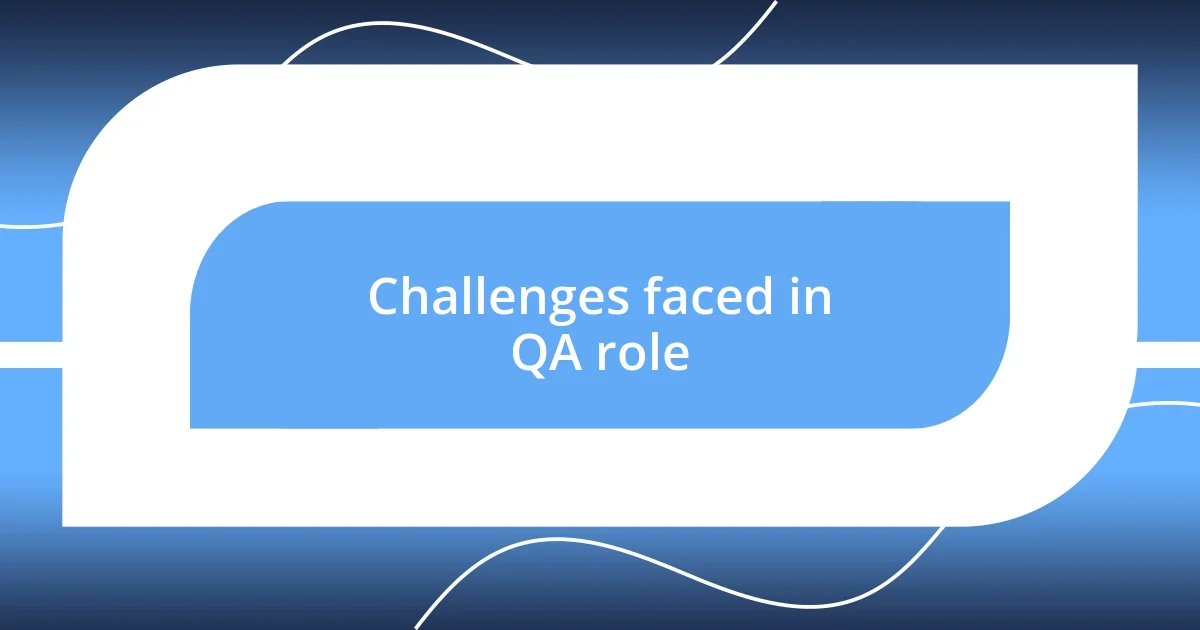
Challenges faced in QA role
In the realm of QA, one of the most significant challenges I faced was managing the ambiguity in requirements. Initially, I found it daunting when specifications were vague or incomplete. I remember staring at a document that lacked detail and thinking, “How can I test this effectively?” It took time, but I learned to seek clarification, rely on my teammates, and embrace the uncertainty as part of the process. This experience reinforced my belief that effective communication within the team was essential for success.
Another challenge was adapting to the rapid pace of software development. On several occasions, I faced the pressure of testing a new feature that was still being developed, often with little time to conduct thorough checks. I vividly recall the adrenaline rush when we had to complete a round of regression testing within hours. It taught me to prioritize effectively and streamline my testing approach—shifting from a perfectionist mindset to a more pragmatic one while ensuring essential checks were met.
Lastly, the emotional toll of a high-pressure environment cannot be underestimated. As I encountered bugs that needed urgent attention right before a release, I felt a mix of anxiety and responsibility. During a late-night testing session, the exhaustion weighed heavily on me. I learned the importance of self-care and managing stress—not just for my well-being but also for the quality of my work. Staying grounded during such times became a crucial part of my QA philosophy.
| Challenge | Insight |
|---|---|
| Ambiguity in Requirements | Learning to communicate and seek clarity can turn confusion into constructive dialogue. |
| Pace of Development | Adapting quickly and prioritizing tasks helps ensure that crucial tests are not missed. |
| Pressure of Releases | Managing stress and maintaining well-being are vital to sustaining quality and performance. |
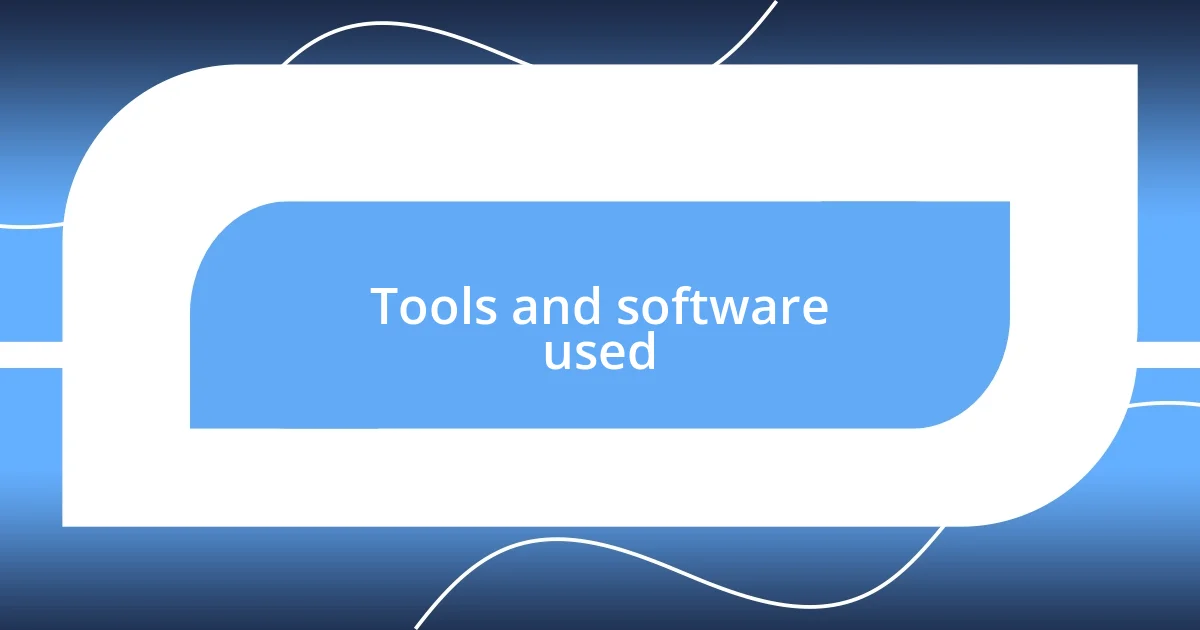
Tools and software used
When I first stepped into the QA world, I quickly found that the tools and software I used were vital to my success. The first application that made a significant impression on me was JIRA for issue tracking. Initially, it felt overwhelming to navigate, but as I started categorizing bugs, I realized it was a powerful way to visualize my workflow. Have you ever used a tool that made you feel like you could truly grasp a chaotic situation? For me, that was JIRA—it turned the chaos of countless bugs into manageable tasks, allowing me to focus on the priority issues.
Another significant software was Selenium, which introduced me to the concept of automated testing. I remember my first attempt to write a test script; it was both exhilarating and frustrating. I spent hours debugging. In the end, the thrill of seeing my script run successfully was incredibly rewarding. Automation opened a new world for me, enabling me to save time on repetitive tasks and focus on more complex scenarios. It raised a pivotal question for me: How can we balance automation with the need for human intuition in testing? I learned that while automation is a time-saver, there’s no substitute for the critical thinking that comes from manual testing.
Additionally, I can’t overlook the importance of collaboration tools like Slack and Confluence. They were essential in bridging communication gaps I didn’t even realize existed. On one particularly busy day, I remember messaging my team on Slack about a testing blocker. Within minutes, we were all on the same page, brainstorming solutions. It highlighted a vital lesson: how powerful effective communication can be, especially in a field where timing and teamwork are everything. Have you had those moments where a tool transformed a challenging situation into a collaborative effort? Those experiences became the backbone of my learning journey in QA.
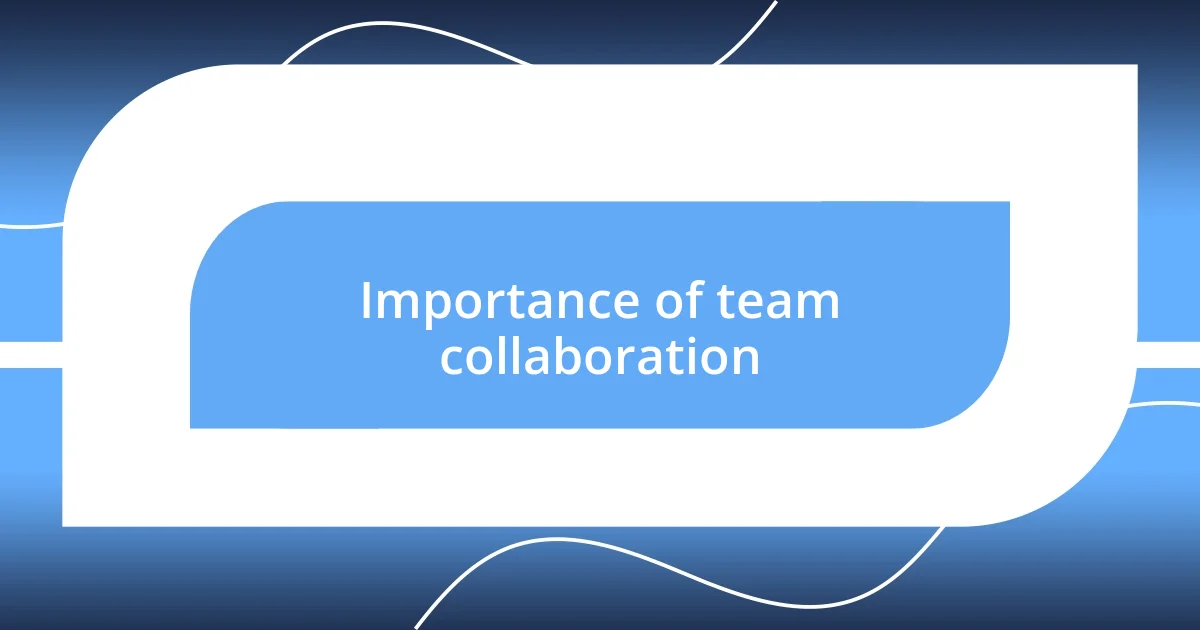
Importance of team collaboration
Team collaboration is really the heartbeat of effective QA work. I quickly learned that when everyone is on the same page, it not only streamlines the testing process but also enhances the quality of the final product. I’ll never forget a day when we were racing against a deadline, and my teammate shared a valuable insight about a recurring bug. That small act helped us avoid a major setback. Have you ever experienced the difference an extra pair of eyes can make? In QA, it’s a game changer.
Listening to others and sharing knowledge fosters a culture where everyone feels empowered. In my first job, there was one team meeting that stood out. We gathered to dissect a particularly tricky issue that had been haunting us for weeks. The experience of bouncing ideas off each other was enlightening; I remember feeling so motivated as solutions emerged from our discussions. It was a reminder that at the end of the day, we all want the same outcome—success for our projects.
Moreover, collaboration reduces the stress of individual responsibility. I remember a project where the pressure was immense, and the looming deadlines made me anxious. But witnessing my teammates come together to support one another was inspiring. We established a system where we could lean on each other’s strengths, which not only lifted some weight off my shoulders but also improved our team’s overall performance. Isn’t it true that working together often transforms challenges into shared victories? In those moments, I truly understood the essence of teamwork in my QA journey.
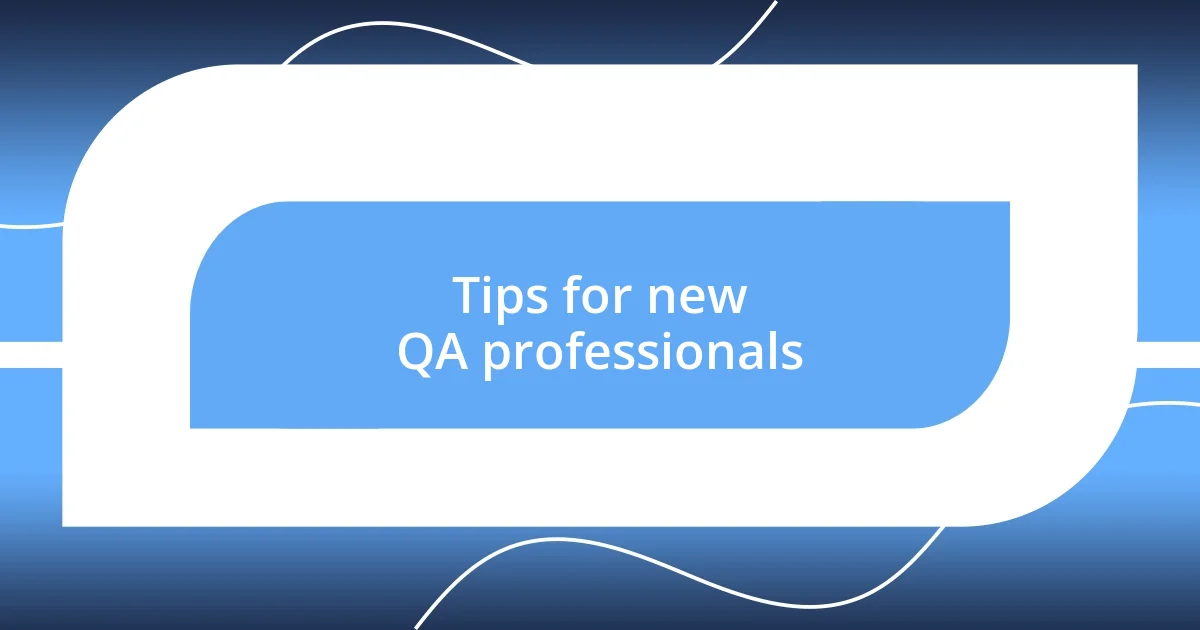
Tips for new QA professionals
Starting out in QA can be daunting, but one crucial tip is to embrace your curiosity. I still vividly recall my first few weeks, where each bug I encountered sparked a need to dig deeper. Why did this happen? What can I learn from it? This mindset not only fueled my growth but also transformed mistakes into learning opportunities. Isn’t it amazing how a simple curiosity can reshape your approach to challenges?
Another piece of advice I’d like to share is to prioritize documentation. Early in my career, I underestimated the value of documenting my findings. There was one instance where a seemingly trivial issue turned out to impact multiple features. I remember the scramble to recall details from a few weeks back—it was chaotic! Since then, I’ve made it a habit to keep detailed records. How has your documentation strategy helped you in tough situations? I’ve found that good documentation acts like a safety net—making it easier to track progress and pinpoint recurring issues.
Lastly, don’t shy away from asking for feedback. I recall a time when I was hesitant to share my testing strategies with my colleagues, thinking I needed to have everything figured out first. But when I finally opened up, I received invaluable insights that improved my testing approach and confidence. Have you experienced the growth that comes from feedback? Realizing that we all have something to learn from each other can be a game changer. These interactions have since shaped my perspective, making me appreciate the collaborative spirit in QA.
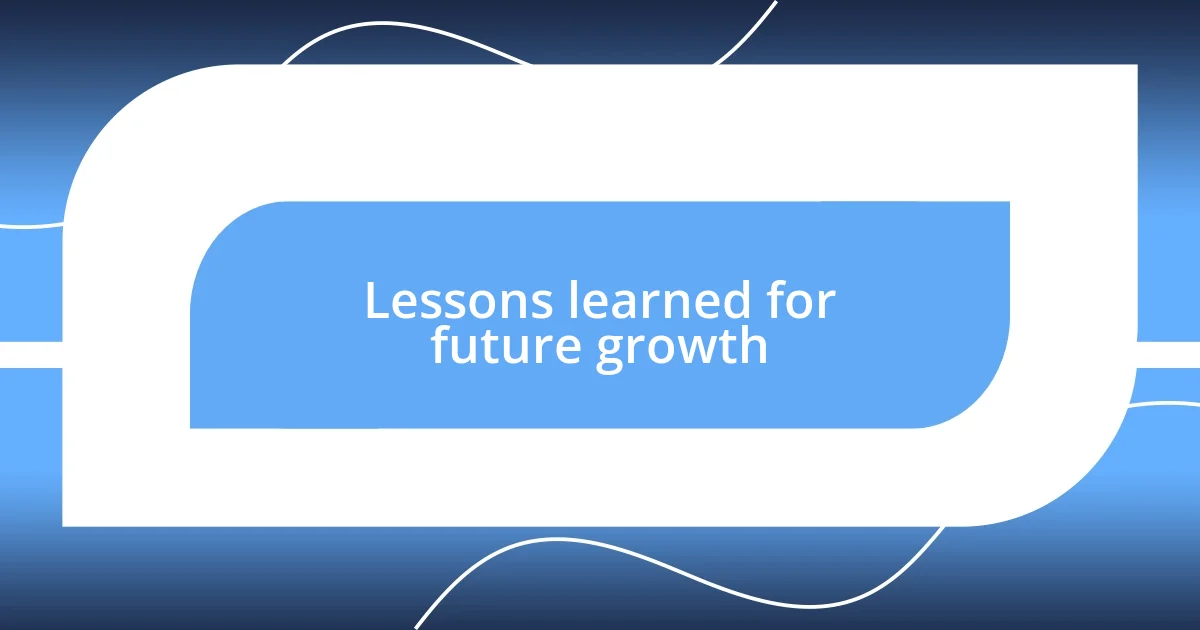
Lessons learned for future growth
One of the most significant lessons I learned is the power of asking “why.” In my first QA role, I remember getting frustrated with some persistent bugs, but instead of just noting them down, I forced myself to dig deeper. Each time I took a moment to dissect the root causes, I not only solved the immediate issue but also prevented future ones. Have you ever felt that rush of insight when you uncover the underlying problem? This habit of inquiry not only made me a better tester but also inspired my teammates to think critically, too.
Another valuable lesson revolves around adaptability. There were moments during my early days when I felt overwhelmed by the ever-changing project requirements. I’ll never forget the project where our testing schedule got uprooted at the last minute. Instead of seeing this as a hurdle, I chose to pivot and see it as an opportunity to learn how to be more agile. Have you found that managing change has taught you resilience? Embracing flexibility in QA doesn’t just prepare you for surprises—it enhances your ability to thrive under pressure.
Lastly, I’ve learned the importance of celebrating small victories. Each time I caught a critical bug before it reached production, I took a moment to appreciate that success. I vividly recall feeling a surge of pride after reporting a major issue just hours before a release; it felt like I was a key player in a much larger game. Isn’t it essential to recognize these milestones? They not only build confidence but also remind us of the impact we hold within our roles. Celebrating even the small wins fuels motivation, making each challenge worthwhile.

